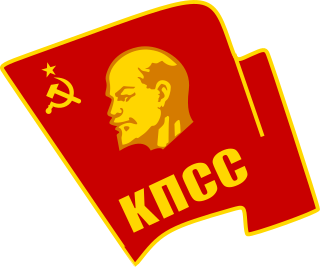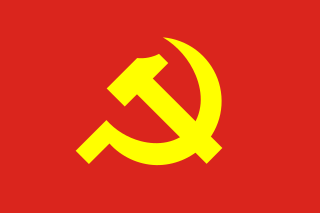Organ of the Cuban government
 |
|---|
|
Related topics |
The Central Committee of the Communist Party of Cuba (PCC) is the highest organ between two congresses.
 |
|---|
The Central Committee of the Communist Party of Cuba (PCC) is the highest organ between two congresses.
The Central Committee was established on 3 October 1965 when the United Party of the Cuban Socialist Revolution was transformed into the present-day Communist Party of Cuba. [1] Between Central Committee plenary sessions the Politburo and the Secretariat meet in its place. [1] It has been led since its establishment in 1965 by the First and Second Secretary of the Central Committee. [1]
Alternate membership of the Central Committee was abolished at the 4th Party Congress, held on 10–14 October 1991, with the intention of streamlining the party's decision-making process. [2]
| Term | Members | Period | Duration | |||
|---|---|---|---|---|---|---|
| Male | Female | Reelected | Start | End | ||
| Provisional | 95 | 5 | 87 | 3 October 1965 | 17 December 1975 | 10 years, 75 days |
| 1st | 117 | 9 | 95 | 22 December 1975 | 17 December 1980 | 4 years, 361 days |
| 2nd | ? | ? | ? | 20 December 1980 | 4 February 1986 | 5 years, 46 days |
| 3rd | 225 | ? | 99 | 7 February 1986 | 10 October 1991 | 5 years, 245 days |
| 4th | 250 | ? | ? | 14 October 1991 | 8 October 1997 | 5 years, 354 days |
| 5th | 130 | 20 | 45 | 8 October 1997 | 16 April 2011 | 13 years, 190 days |
| 6th | 71 | 44 | 76 | 19 April 2011 | 16 April 2016 | 4 years, 363 days |
| 7th | 85 | 57 | 58 | 19 April 2016 | 16 April 2021 | 4 years, 362 days |
| 8th | 62 | 53 | — | 19 April 2021 | Incumbent | 3 years, 277 days |

The Communist Party of the Soviet Union (CPSU), at some points known as the Russian Communist Party, All-Union Communist Party and Bolshevik Party, and sometimes referred to as the Soviet Communist Party (SCP), was the founding and ruling political party of the Soviet Union. The CPSU was the sole governing party of the Soviet Union until 1990 when the Congress of People's Deputies modified Article 6 of the 1977 Soviet Constitution, which had previously granted the CPSU a monopoly over the political system. The party's main ideology was Marxism–Leninism. The party was outlawed under Russian President Boris Yeltsin's decree on 6 November 1991, citing the 1991 Soviet coup attempt as a reason.

The Communist Party of Vietnam (CPV) is the founding and sole legal party of the Socialist Republic of Vietnam. Founded in 1930 by Hồ Chí Minh, the CPV became the ruling party of North Vietnam in 1954 and then all of Vietnam after the collapse of the South Vietnamese government following the Fall of Saigon in 1975. Although it nominally exists alongside the Vietnamese Fatherland Front, it maintains a unitary government and has centralized control over the state, military, and media. The supremacy of the CPV is guaranteed by Article 4 of the national constitution. The Vietnamese public generally refer to the CPV as simply "the Party" or "our Party".

The Political Bureau (Politburo) of the Communist Party of Vietnam Central Committee is the highest body of the Communist Party of Vietnam (CPV) in between gatherings of the National Congress and of the plenary sessions Central Committee. According to Party rules, the Politburo directs the general orientation of the government, and by that, it has dominant power in the politics of Vietnam.

The 7th National Congress of the Communist Party of Vietnam was held in Ba Đình Hall, Hanoi from 24–27 June 1991. The congress occurs once every five years. A total of 1,176 delegates represented the party's 2.1 million card-carrying members.
The central committee is designated as the highest organ of a communist party between congresses. Per the principles of democratic centralism and unified power, the central committee is empowered to deal with any issue that falls under the party's purview. While formally retaining this role in socialist states, commonly referred to as communist states by outside observers, in practice, it delegates this authority to numerous smaller internal organs due to the infrequency of its meetings. The term of a central committee of a ruling communist party is usually five years. The party congress elects individuals to the central committee and holds it accountable. At the first central committee session held immediately after a congress, it elects the party leader, an office usually titled general secretary of the central committee, a political organ, commonly known as the politburo, and an executive organ, customarily named the secretariat.

The First Secretary of the Central Committee of the Communist Party of Cuba is the top leader of Cuba. The First Secretary is the highest office within the Communist Party of Cuba as well as ranking first in the Politburo, the highest decision-making body in Cuba, which makes the office holder the most powerful person in the Cuban government. In communist states the First or General Secretary of the Communist Party is typically the de facto leader of the country and a more powerful position than state offices such as President or Prime Minister, when those positions are held by different individuals.

The Communist Party of Cuba is the sole ruling party of Cuba. It was founded on 3 October 1965 as the successor to the United Party of the Cuban Socialist Revolution, which was in turn made up of the 26th of July Movement and Popular Socialist Party that seized power in Cuba after the 1959 Cuban Revolution. The party governs Cuba as an authoritarian one-party state where dissidence and political opposition are prohibited and repressed. The Cuban constitution ascribes the role of the party to be the "leading force of society and of the state".

The Politburo is the highest political organ of the Central Committee of the Communist Party of Cuba.

The Secretariat of the Workers' Party of Korea, formerly known as the Executive Policy Bureau (2016–21), manages the work of the Politburo of the Workers' Party of Korea and its Presidium. The General Secretary leads the work of the Secretariat, and the body is composed of several members.

The Political Bureau of the Central Committee of the Communist Party of the Soviet Union, abbreviated Politbureau CC CPSS or simply Politbureau, was the highest political body of the Central Committee of the Communist Party of the Soviet Union and de facto a collective presidency of the USSR. It was founded in October 1917, and refounded in March 1919, at the 8th Congress of the Bolshevik Party. It was known as the Presidium from 1952 to 1966. The Politburo's authority was significantly undermined during the August coup and subsequently ended three months later upon its dissolution in 1991.

The Central Committee of the Communist Party of the Soviet Union was the highest organ of the Communist Party of the Soviet Union between two congresses. According to party statutes, the committee directed all party and governmental activities. The Party Congress elected its members.

The Secretariat is the highest executive organ of the Central Committee of the Communist Party of Cuba.
The 3rd Politburo of the Communist Party of Cuba (PCC) was elected in 1986 by the 1st Plenary Session of the 3rd Central Committee, in the immediate aftermath of the 3rd Party Congress.
The 4th Politburo of the Communist Party of Cuba (PCC) was elected in 1991 by the 1st Plenary Session of the 4th Central Committee, in the immediate aftermath of the 4th Party Congress.
The 6th Politburo of the Communist Party of Cuba (PCC) was elected in 2011 by the 1st Plenary Session of the 6th Central Committee, in the immediate aftermath of the 6th Party Congress.
The 7th Politburo of the Communist Party of Cuba (PCC) was elected in 2016 by the 1st Plenary Session of the 7th Central Committee in the immediate aftermath of the 7th Party Congress.
The 8th Politburo of the Communist Party of Cuba (PCC) was elected in 2021 by the 1st Plenary Session of the 8th Central Committee in the immediate aftermath of the 8th Party Congress.
The 8th Secretariat of the Communist Party of Cuba (PCC) was elected in 2021 by the 1st plenary session of the 8th Central Committee in the immediate aftermath of the 8th Party Congress.
The 7th Secretariat of the Communist Party of Cuba (PCC) was elected in 2016 by the 1st Plenary Session of the 7th Central Committee in the immediate aftermath of the 7th Party Congress.
The 6th Secretariat of the Communist Party of Cuba (PCC) was elected in 2011 by the 1st Plenary Session of the 6th Central Committee in the immediate aftermath of the 6th Party Congress.
Articles and journals:
Books: